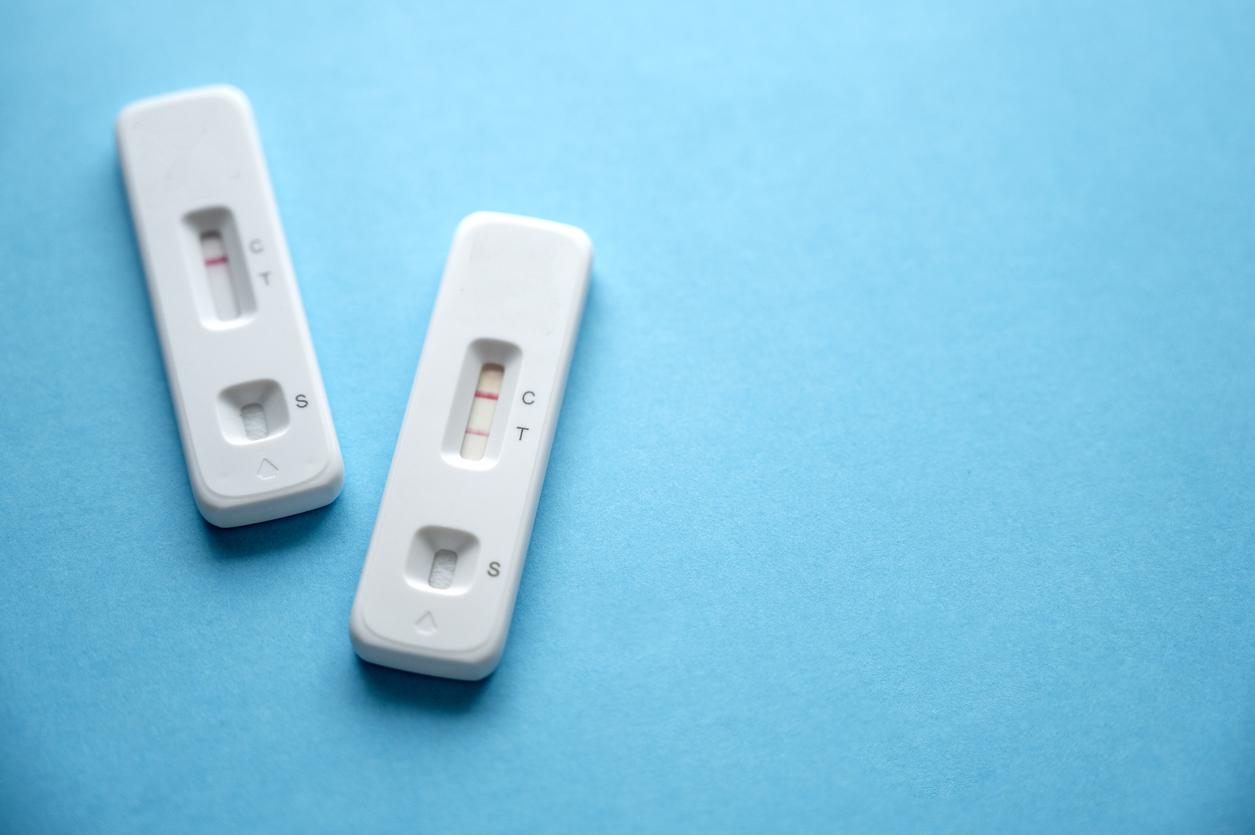“At the beginning of January, no test should take more than 24 hours between the test request and its result. Antigenic tests will be used massively, in particular for people who have symptoms when it is necessary to screen quickly“, at announced Emmanuel Macron during the speech on Tuesday, November 24.
Antigenic, classic PCR: what’s the difference?
Like the benchmark RT-PCR tests, these new, faster tests are performed by taking a swab from the nose. The difference is that they are much faster and allow you to read the results, like a pregnancy test, in 15 to 30 minutes.
While conventional tests look for the virus genome (the RNA), antigen tests look, as their name suggests, the antigen present on the surface of the virus (the Spike and N proteins are used as a marker).
The particles collected at the bottom of the nose are mixed with a reagent deposited on a strip. The color change makes it possible to quickly determine whether the person has Covid or not.
The advantage of antigen tests: a quick result
Remember that the antigenic tests have been deployed since October in addition to the RT-PCR tests, they have two advantages: they can be carried out outside the laboratory – at the doctor’s and in the pharmacy in particular – and provide a result quickly, in less than 30 minutes.
“We have a reliable PCR test, but it is not sufficient given the high demand. This forces us to expand the arsenal of tests”, explained Dominique Le Guludec, president of the College of the High Authority for Health (HAS) at a press conference on October 9, before summarizing: “The goal is to test more people and faster.”
The other advantage is that they are inexpensive and simple to make.
The downside: less reliability
According to the High Authority for Health (HAS), antigenic tests are a little less sensitive than reference PCR tests : in the event of a negative result, the result is reliable in 80% of cases with an antigen test, whereas it is 95% reliable with a conventional test. In other words, the percentage of “false negatives” is higher with rapid antigen tests.
However, the HAS was in favor of their use in view of the speed of obtaining results to limit the progression of the virus. Conversely, their reliability for detecting positives is 99%, therefore high (1% false positives).
But in practice, Franck Pérez, director of the cell biology and cancer unit (Institut Curie, CNRS), underlines during a press briefing organized on November 24, that given the large number of antigenic tests available on the market, it remains difficult to assess their real sensitivity, who does he remember also depends on “the good realization of the gesture”. According to him, the reliability of the tests could be between 60% and 70% in real life, dtherefore less than that of the reference RT-PCR tests. This means that one in three people would pass through and not be screened.
The HAS, which does not have the mission to examine the tests marketed one by one, confirms that there is a “heterogeneity” in the tests available on the market, “some have good performance, others do not”. The Ministry of Health publishes list of antigen tests marketed in France.
The risk ? Feel reassured after receiving a negative test and relax barrier gestures. “Mask wearing, hand washing and social distancing should be maintained, even if the test is negative.” To sum up, a negative test should not change behavior. “The most important thing to continue to lower the R are the distancing measures and the barrier gestures, it will be much more effective than carrying out massive screening with tests whose sensitivity is not up to par.”
The researcher, however, believes that these tests are interesting for sorting cases, for example in the context of a cluster, where the viral loads are high, to quickly stop the spread of the virus. Or even as part of regular screening, even if the sensitivity is less good. “By testing every two or three days for example, we will test often enough, if the viral load is high we can detect it.”
Antigenic test: for whom?
These tests being less reliable than the reference PCR tests, they are reserved for people who present the least risk of being ill, and those who are least likely to develop a serious form.
According to the Ministry of Health, are concerned in priority:
>> The symptomatic people within the first 4 days after onset of symptoms who meet these conditions:
- people have under 65 and present no risk of severe form of covid-19
- The RT PCR reference test result for the detection of SARS-COv-2 cannot be obtained within 48 hours
>> Symptomatic people (less than 4 days) and over 65 and/or frail must confirm with a conventional RT-PCR test in the event of a negative antigen test.
>> Antigen testing is contraindicated in asymptomatic people (excluding clusters), contact cases and people who have been symptomatic for more than 4 days.
However, the HAS has just updated its recommendations : in a notice dated 28 November, it now decides “in favor of their use in contact persons”. She justifies:new scientific publications have appeared – and they are reassuring about the ability of antigen tests to effectively diagnose contact persons.” The time frame for carrying out the antigen test is the same as that recommended for RT-PCR:
- as soon as possible (within 4 days), then at 7 days for high-risk contacts (within the same household as an infected patient)
- 7 days after exposure for other contact persons (low risk).
In addition, “large-scale screening operations within targeted populations (universities, nursing homes, etc.) may be authorized with the aim of flushing out clusters. “In these cases, antigenic tests are interesting because you have to detect quickly to break the chains of transmission as quickly as possible”, justified Cédric Carbonneil, head of the professional acts evaluation department of the HAS this October 9 during a press briefing.
– Note that if the test must be carried out within the first 4 days after onset of symptoms (and not within 7 days as is the case for conventional PCR tests), it is because it is during this period that they are the most efficient (the viral load is higher).
– Note again that if people at risk are excluded, it is because this test can be falsely negative in at least 20% of cases. We cannot afford not to screen a person at risk of potentially serious infection.
Antigen test: where to get tested?
Thanks to a stopped published in the Official Journal in mid-October, doctors and pharmacists are authorized to carry out antigen tests, as well as dental surgeons, midwives, physiotherapists and nurses. Other health professionals can also practice them, under the responsibility of a doctor, a pharmacist or a nurse: medical electroradiology technicians, medical laboratory technicians, pharmacy assistants, caregivers.
In concrete terms, many pharmacies offer screening by antigen test. Medical and nursing offices too.
They are also deployed in nursing homes. Brigitte Bourguignon, Minister Delegate for Autonomy announced Thursday, November 19 that staff should be screened every week. The objective is to test staff, including asymptomatic ones, to prevent them from bringing in the virus and contaminating residents.
But also in the hospital emergency departments to quickly identify Covid patients, as well as in airports or ports.
Pilot operations also began on Monday 23 November in high schools in Ile-de-France. They will take place over several weeks in about thirty high schools spread over the whole of the Île-de-France region. Objective: quickly identify people carrying the virus and break the chains of contamination, in order to better protect young people, their families and the entire educational community.
Screening campaigns may also be held within communities and businesses, according to a protocol and under the responsibility of a health professional. The company health protocol updated since the reconfinement already specifies that “the employer is required to organize the conditions allowing the proper execution of these tests and the strict preservation of medical secrecy, no results can be communicated to him”.
Antigenic test: price and coverage, results
Antigen tests are supported at 100% by health insurance. There is no need to present a medical prescription. The cost of the bill varies depending on where the test is performed. For a test carried out in consultation, the general practitioner charges 46 euros.
Once the test has been carried out, a written traceability document of the result (whether positive or negative) is completed by the healthcare professional and given to the patient.
- In the event of a negative antigen test: barrier gestures should continue to be rigorously observed. If new symptoms appear, a new test will have to be done.
- In the event of a positive antigen test: the patient must isolate themselves immediately. He must contact his attending physician in order to discuss the health recommendations with him and list the contact persons. Then the Health Insurance contacts the patient to complete this list.
Remember that to alert and protect loved ones, the person tested positive can declare “positive case” in the TousAntiCovid application . To do this, she registers a 6-character alphanumeric code or a QR code to be scanned by her doctor or the laboratory. An alert is then sent to all users who have been in close contact with it in the previous days.
Will more tests be coming?
In fact, there are two alternatives to the PCR tests currently used:
- The first way is improve sampling techniques This is where antigen testing comes in. The doctor, pharmacist, or any other health professional can perform a test directly, without going through an analysis in a laboratory (we speak of TROD), which should make access to screening more fluid.
- The second way is to complete the screening offer with other direct debit methods : the saliva tests in symptomatic patients, oropharyngeal tests (the analysis is done on a sputum) in asymptomatic patients.
In the longer term, when the vaccination campaign has started, we will also need to screen to know if we have developed immunity and we will need serological tests and quick.
IN VIDEO: the explanations of Franck Perez, Scientific Director at the Institut Curie
Read also :
- Coronavirus and transmission: how to protect yourself?
- Covid-19: a study suggests reducing the time spent in places of contamination
- Are air purifiers effective against coronavirus?
















